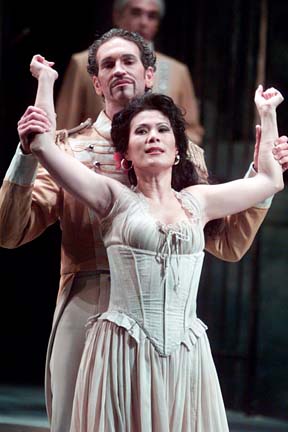

REVIEW

|
Ah, Carmen! ‘Carmen’ hits stage
with real passionBy Ruth O. Bingham
Special to the Star-BulletinNo wonder it is one of the most popular operas ever written: It almost always succeeds simply on the strength of its structure, music and plot. The quality of a specific production, however, relies on the performers who inhabit Carmen's complex and demanding roles.
Hawaii Opera Theatre, directed by Bernard Uzan of L'Opéra de Montréal, assembled a strong cast that created real passion on stage.
Ning Liang, petite, lithe and olive-skinned, captured Carmen's spitfire temper with her chameleon-like mezzo-soprano (she threw a great tantrum). Liang's voice was remarkably distinctive: dark and veiled in that all-important lower register, brighter higher up, sometimes forward, then suddenly so far back, she sounded as if she had swallowed it. Her voice was neither large nor beautiful, but it suited Carmen, and, most importantly, no other voice on stage sounded anything like it.
Equally important in Carmen's mercurial role was Liang's excellent acting: She teased, seduced, spat, snarled, pouted and even danced, playing real castanets quite well.
The role of Don José could have been a problem: James Cornelison, brought in to sing Narraboth in "Salome," agreed to fill in for the scheduled tenor, Matthew Kirschner; fortunately, Cornelison's large, youthful tenor suited his role. In his acting, he played toward Don José's awkward naiveté rather than his hot temper, which paired Cornelison more naturally with Micaela, his hometown girl, than with the fiery Carmen. Throughout, Cornelison sang his heart out, and his pleading in the Flower Song was especially heart-rending.
Karen Driscoll made a lovely Micaela, physically as well as vocally: sweet, light on her feet, with a graceful lyric soprano. Bass-baritone Phillip Skinner was an aptly arrogant and regal Escamillo, the Toréador, despite his sluggish rhythms and an odd tendency to sing with his eyes half-closed.
Carmen must have woven a spell of enchantment, for even secondary characters seemed to shine in the almost palpable adrenaline on stage.
On Friday, baritone Quinn Kelsey (Moralès) sounded wonderful, as did bass-baritone Jamie Offenbach (Zuniga) -- what a pity he was shot! The smugglers, baritone Erik Haines (Le Dancaïre) and tenor Eric Van Hoven (Le Rememdado) paired beautifully, and although the gypsies' voices did not match well, Mary Chesnut (Frasquita) and Georgine Stark (Mercédès) added much with their singing and acting.
If there were times when the enchantment faltered, they were in the large-group staging, which tended alternately toward the static (the street children, the non-vending vendors), the derivative (borrowing from "Zeffirelli," "West Side Story" and "Les Miserables"), or the nonsensical, such as Carmen's awkward pantomime of death.
Unresolved staging details can drive an audience crazy: What military officer would allow his soldiers to flirt with factory girls while on duty? Why would the factory girls arrive at work in their undergarments? And the funeral procession portending death in the opening, unsupported by the music, reeked of paste-on symbolism.
Fortunately, much of the staging with smaller groups was good, as in Carmen's seguidilla and the lovers' duet. The outlaws' climb into the mountain pass was both beautiful and effective, and the flamenco dancers, choreographed by Vanessa M. Chong, added spice.
Peter Dean Beck's designs featured an effective modular set that transformed smoothly into four settings, all arrayed around a center front circle, apparently this season's signature shape.
Although much of the credit for a good balance between singers and orchestra belongs to Bizet's lighter scoring, conductor Mark Flint also manipulated tempos to fit the moment and held groups together even when ensemble wavered. Especially effective were Flint's tender letter-reading music and his exquisite entr'acte to Act III.